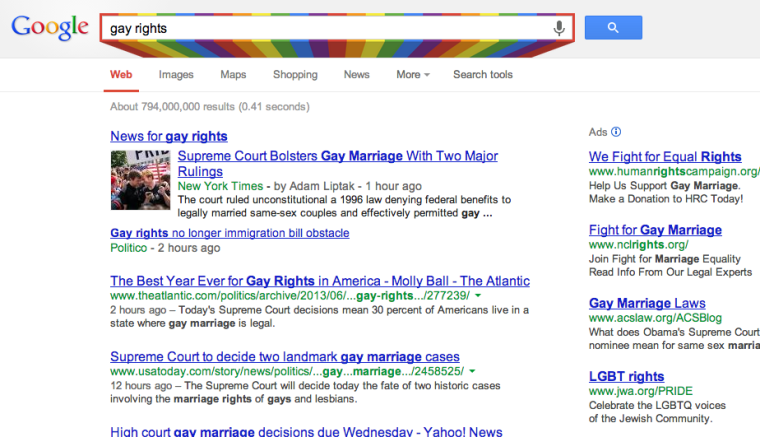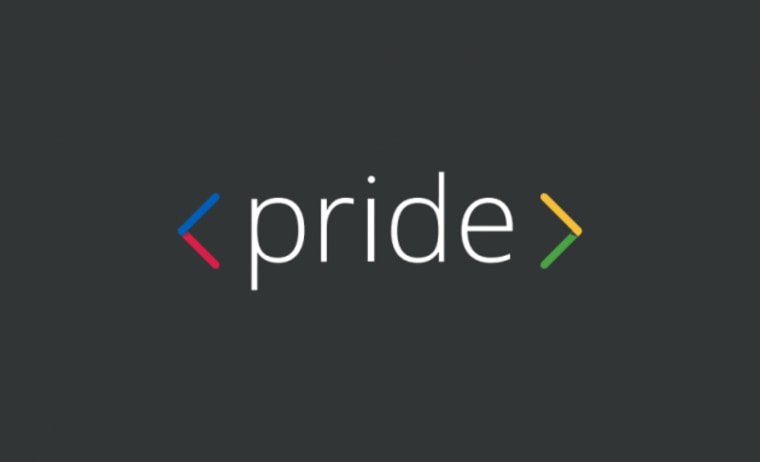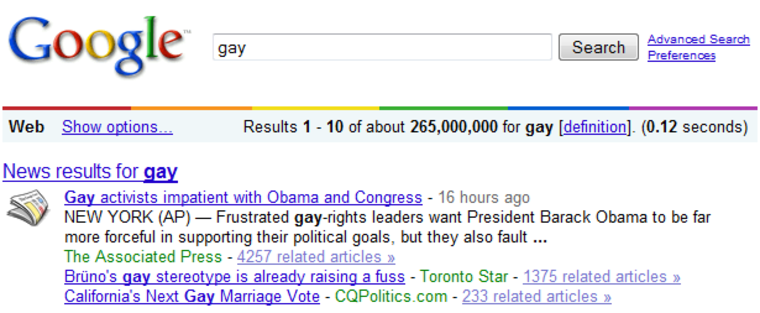
As with many a historic moment, Google commemorated Wednesday's Supreme Court decision to strike down the 1996 Defense of Marriage act, and pave the way for legal gay marriage in California, with a dedicated design. If you search for a variety of related keywords, like "gay marriage" (or just "gay," for that matter), "homosexuality," or "domestic partnership," Google's simple search box is instantly bedazzled with the LGBT rights movement's iconic rainbow coloring.
This subtle Google Easter egg commemorates more than the landmark court decisions — it's also part of a month-long celebration of Gay and Lesbian Pride Month. And it's not Google's first time vocalizing its support for marriage equality and LGBT rights. Basic versions of the rainbow design have been appearing since 2009, and there have also been many Google Doodles celebrating famous gay artists and icons, including Maurice Sendak, Keith Haring and Alan Turing.
It's not just about Doodles and Easter eggs, though. Google is a regular presence at gay pride parades across the world, booking space in the official marching order and handing out hundreds of T-shirts and additional swag emblazoned with LGBT-friendly slogans and logos. In 2008, Sergey Brin, co-founder of Google, wrote a blog post airing his, and his company's, opposition to California's Proposition 8, which blocked gay marriage in California. In 2010, the company began providing additional benefits to LGBT couples who did not receive the same tax breaks as their heterosexual counterparts.
Google might just be looking out for its own "Gayglers" — the term the company uses to describe its many LGBT-identified employees. Critics may see Google's LGBT activism, like many a tech company's recent foray into gay-friendly themes, as a simple way to keep up appearances as a socially progressive and open-minded organization that's not eager to lose the support of legions of customers.
Some even oppose the notion of "pinkwashing" on the grounds that Google is overstepping its bounds as a private company trying to solve global political issues on its own terms. But more than anything, Google's social and political ventures, like its gay-friendly Google art, might simply be a sign of changing public attitudes towards LGBT rights.

When Google opposed Proposition 8, Brin himself admitted that it seemed "an unlikely question for Google to take an official company position on." But he added that, for all of the proposed amendment's controversies, it was "the chilling and discriminatory effect of the proposition on many of our employees that brings Google to publicly oppose Proposition 8."
Google originally justified its "Legalize Love" campaign as a means to help "promote safer conditions for gay and lesbian people inside and outside the office in countries with anti-gay laws on the books." But the movement's mission quickly evolved. Within days of its announcement, a Google spokesperson told the Washington Post that "Legalize Love is our call to decriminalize homosexuality and eliminate homophobia around the world."

The search giant's worldwide influence is not to be underestimated. Still to be determined: Whether Google's efforts to raise awareness about and diplomacy with North Korea will succeed. For sure, that will take more than a Google Doodle.
Yannick LeJacq is a contributing writer for NBC News who has also covered technology and games for Kill Screen, The Wall Street Journal and The Atlantic. You can follow him on Twitter at @YannickLeJacq and reach him by email at: ylejacq@gmail.com.